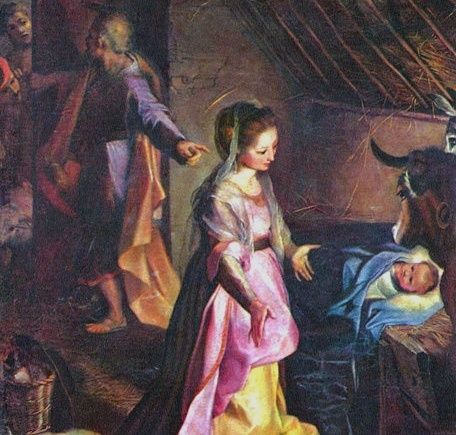Here’s a brief poem on the Welsh word, Hiraeth, which is a longing for the past or homesickness. “As loneliness slips in beside …”
Also look over at Pamela Petro’s beautiful thoughts on this word, Deep Longing for Home, Hiraeth.
Here’s a brief poem on the Welsh word, Hiraeth, which is a longing for the past or homesickness. “As loneliness slips in beside …”
Also look over at Pamela Petro’s beautiful thoughts on this word, Deep Longing for Home, Hiraeth.
Author Daniel Handler writes about reading and loving poetry.
If you were to walk into my living room on some weekend night, that would be creepy. But before I stood up alarmed and demanded to know what you were doing there, you would see me in a big black leather chair that, I’ve been told, is too big for the room. I’d be all dressed up, and reading poetry.

The Nativity, by Federico Barocci, c. 1597
By: G. K. Chesterton
There fared a mother driven forth
Out of an inn to roam;
In the place where she was homeless
All men are at home.
The crazy stable close at hand,
With shaking timber and shifting sand,
Grew a stronger thing to abide and stand
Than the square stones of Rome.
For men are homesick in their homes,
And strangers under the sun,
And they lay on their heads in a foreign land
Whenever the day is done.
Here we have battle and blazing eyes,
And chance and honour and high surprise,
But our homes are under miraculous skies
Where the yule tale was begun.
A Child in a foul stable,
Where the beasts feed and foam;
Only where He was homeless
Are you and I at home;
We have hands that fashion and heads that know,
But our hearts we lost – how long ago!
In a place no chart nor ship can show
Under the sky’s dome.
This world is wild as an old wives’ tale,
And strange the plain things are,
The earth is enough and the air is enough
For our wonder and our war;
But our rest is as far as the fire-drake swings
And our peace is put in impossible things
Where clashed and thundered unthinkable wings
Round an incredible star.
To an open house in the evening
Home shall men come,
To an older place than Eden
And a taller town than Rome.
To the end of the way of the wandering star,
To the things that cannot be and that are,
To the place where God was homeless
And all men are at home.
“Must the artist always be vulnerable to being pushed aside by manipulative phonies?” A poem and a little talk by John Tranter from the current issues of Poetry.
Carols are buried deep in Polish hearts and may reveal a distinctive beauty in Polish poetry. Cynthia Haven makes this connection when writing about the “Slavic Choral Concert Christmas in Kraków” at the Historic Hillside Club in Berkeley, California, quoting that great poet Czesław Miłosz on the charm and freshness of Polish carols. You can hear a snatch of them on this CD site.
Thanks to Patrick Kurp for this link and his additions to the topic and poem quotations.
“The Windhover” by Gerard Manley Hopkins is the topic of this podcast, Poetry Off the Shelf, by the Poetry Foundation. It’s a good 11 minutes of poetry discussion, which perhaps you can’t get at the local pub.
I fell down in my obligation to link to yesterday’s stop on the Virtual Book Tour. But dry your tears—it’s right here, at Review From Here. (Can’t seem to find a permalink; if you’re reading this after time has passed, you may have to scroll down or search.)
Today’s stop is at The Story Behind the Book.
Joe Carter at The Evangelical Outpost links to a story, and posts a couple video clips, concerning the first American attempt to produce a Shakespeare play in the original accents of Shakespeare’s time. The point of the exercise seems to be, mainly, to demonstrate how much better the poetry rhymed back when it was written. Continue reading "Speak the speech, I pray thee, trippingly on the tongue…"
Carl Dennis has a new collection of poems, which the Buffalo News says emphasizes the limits of empathy, for better or worse. [via Poetry Foundation]
MORTAL my mate, bearing my rock-a-heart
Warm beat with cold beat company, shall I
Earlier or you fail at our force, and lie
The ruins of, rifled, once a world of art?
The telling time our task is; time’s some part,
Not all, but we were framed to fail and die—
One spell and well that one. There, ah thereby
Is comfort’s carol of all or woe’s worst smart.
Field-flown, the departed day no morning brings
Saying ‘This was yours’ with her, but new one, worse,
And then that last and shortest…
“How dull it is to pause, to make an end,
To rust unburnish’d, not to shine in use!”
Manly Poems, selected by the writers and readers of The Art of Manliness (via SB).